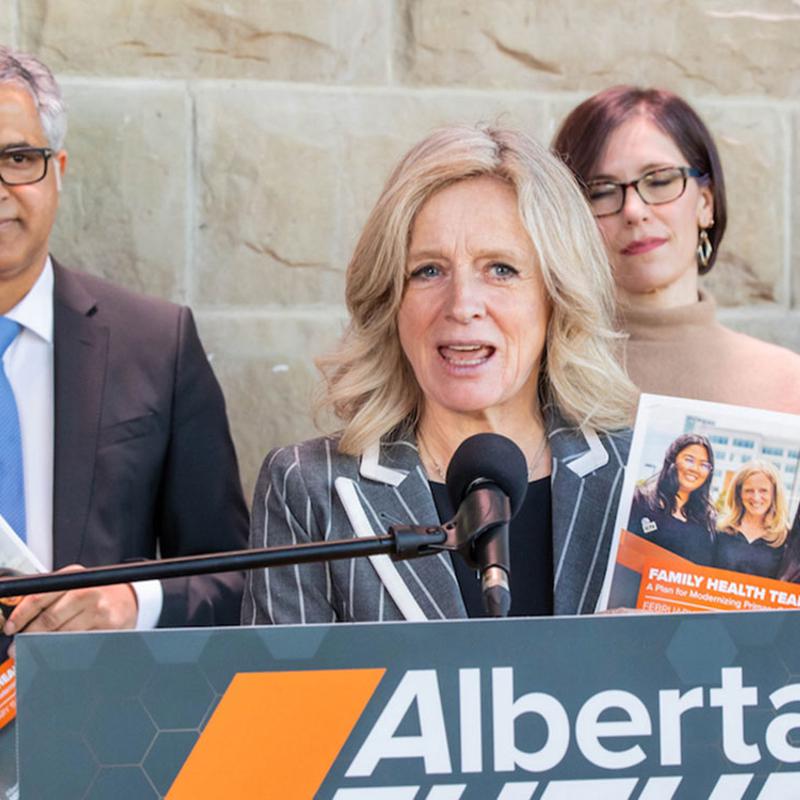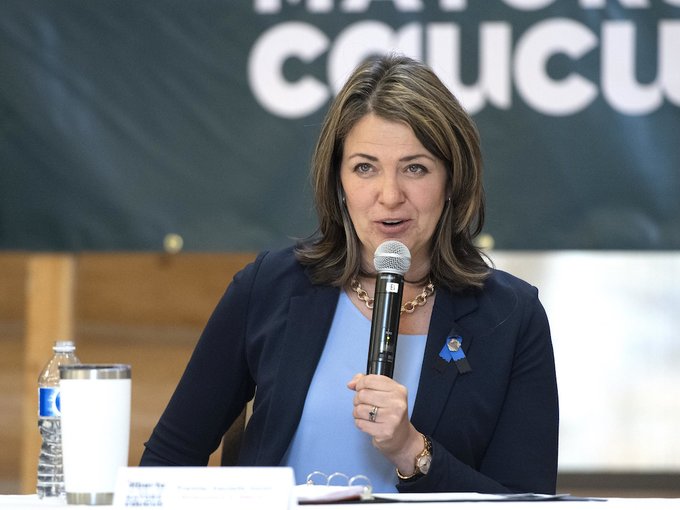If it is an axiom of practical politics that you can never believe anything until it’s been officially denied, we now have confirmation Danielle Smith’s government is bent on privatizing health care in Alberta.
ANNOUNCEMENTS, EVENTS & MORE FROM TYEE AND SELECT PARTNERS
Stay Sharp on Alberta. Sign up for Alberta Edge
The Tyee launches a new free newsletter with fresh reporting and curated must reads. Just in time for the big vote.
CONTEST: Win an Emily Carr University Prize Pack for Teens
Help youth imagine their creative future with a course bundle and gift certificate.
We knew this already, of course, so it doesn’t exactly qualify as news.
Smith herself has said many things that clearly indicate she drank the Kool-Aid back in the 1990s, when she was an intern at the Fraser Institute, and believes firmly that health care fully belongs in the private sector.
The most persuasive recent example was her June 2021 (non) academic paper for the University of Calgary’s public-private (propaganda) partnership, the so-called School of Public Policy, wherein she asserted “we can no longer afford universal social programs that are 100 per cent paid by taxpayers,” and that includes public health care.
“Once people get used to the concept of paying out of pocket for more things themselves then we can change the conversation on health care,” she confidently wrote.
The Tyee is supported by readers like you
Join us and grow independent media in Canada
“But we could take it one step further,” Smith continued. “If we establish the principle of Health Spending Accounts, then we can also establish co-payments.”
Naturally, many Alberta voters will refuse to believe that Smith meant what she said, the traditional response to politicians who advocate really dangerous stuff.
This may change, though, now that Health Minister Jason Copping has firmly denied there’s anything to the idea that privatizing delivery of health care means they’re privatizing health care.
After all, folks, we’re all mavericks out here in the New West, and if there’s one thing mavericks don’t trust, it’s official denials!
All kidding aside, Copping’s rather lengthy statement last week about “chartered surgical facilities” denying that these privately run, publicly subsidized surgical mini-hospitals are evidence that the United Conservative Party government is privatizing our public health-care system a piece at a time suggests that government has been doing some polling and is getting back a message that Albertans don’t exactly trust them on this file.
“Chartered surgical facilities are part of our public health-care system,” Copping insisted. “These are surgeries paid for by the province, just like surgeries that happen in a hospital.”
“It is all one publicly funded system,” he said — sounding just a little plaintive in his press release.
“The benefits of chartered surgical facilities are many, including allowing the system to increase capacity overall,” Copping stated.
“With these facilities set up to handle more routine surgeries, they can complete a larger number than at hospitals alone. This also allows hospitals to handle more complex and urgent surgeries, which is exactly what they should be doing.”

They’re Off! Alberta NDP Offers an Election Campaign Preview
Alas, this is the stuff of the fantasies purveyed by the Fraser Institute, the Vancouver-based propaganda factory financed by the corporate sector to persuade us that the private sector is the answer to all our problems, even long surgical wait times. The Fraser Institute’s corporate funders, needless to say, are always looking for an opportunity to shove their boots in the door, so they can force it open a little wider until Smith’s dream of fully privatized health care is realized.
You’re not going to increase capacity, of course, when there are limited numbers of health-care professionals — say, orthopedic surgeons — to go around. You’re just going to move the capacity from public hospitals to for-profit private hospitals staffed by surgeons who will lobby for more profitable opportunities.
Somehow privatization advocates like Copping always forget to remind their listeners that even when they’re theoretically part of the public system, surgeries in private hospitals seem to end up costing more than the same surgeries did in public facilities — a decade ago it was about $500 more per surgery for hip and knee operations, and it’s almost certainly more now.
And when people like Smith wax poetic about the topic — “maybe moms would even be able to opt for longer stays to get used to the new life they are going to have with their baby, the way they used to at the Grace Hospital,” she rhapsodized in her University of Calgary essay — she didn’t mention what happens when a private clinic goes broke, as the one Ralph Klein’s government allowed to set up in the old Grace Hospital did.
The public has to pay to clean up the mess is what happens — rather like Smith’s solution to oil industry pollution, come to think of it — and public hospitals have to pick up the slack, delaying other surgeries.
As for dumping more complex and urgent surgeries on the public sector, that allows privatization advocates to falsely claim private hospitals are more efficient and better run than they are.
Well, at least the UCP isn’t talking about letting surgeons do their own direct patient bookings — yet.
You can count on it, though, that this will soon be being talked up as a “cost-saving” measure, and surgeons will be yakking righteously about the right of patients to choose their own doctors.
Research shows that’s when the system really goes to hell in a hand basket — when there’s actually an incentive for double-dipping doctors in private practice to prolong waits for their public-sector patients.
But I’ve said enough. We can now say with confidence that privatization is on the UCP’s agenda. After all, it’s been officially denied. ![]()
